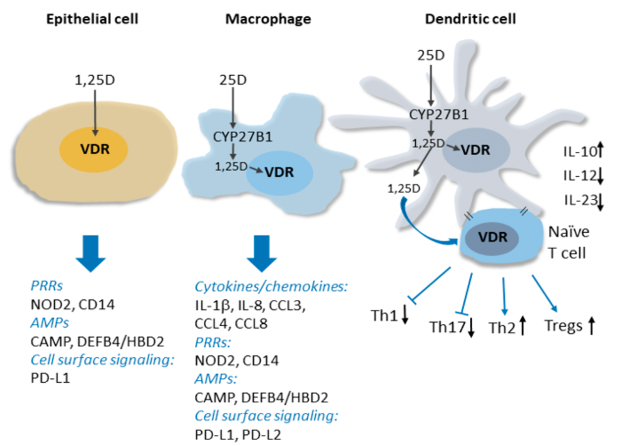Vitamin D is best known for its role as a key regulator of calcium homeostasis and bone health in children and adults. However, it has been the subject of increasing interest, primarily because its significance extends beyond skeletal health and to the non-classical actions of vitamin D, including a range of immune-related disorders. Our interest in and understanding of the role of vitamin D in the regulation of immunity has increased dramatically over the past few decades as research has progressed. There is solid evidence that vitamin D supplementation can reduce infection rates in pediatric populations. There is also growing evidence for the beneficial effects of vitamin D supplementation in the prevention of autoimmune diseases, and promising data links vitamin D deficiency to increased rates of childhood asthma and other allergic conditions.
Clinical studies have linked vitamin D deficiency to an increased incidence of infections, autoimmunity, and allergies. At the molecular level, vitamin D can signal through the nuclear vitamin D receptor (VDR) (as shown in the figure below), a ligand-regulated transcription factor. The VDR and vitamin D metabolic enzymes are expressed throughout the innate and adaptive divisions of the immune system. The advent of genome-wide approaches to gene expression profiling has led to the identification of many VDR-regulated genes implicated in the regulation of innate and adaptive immunity. Based on molecular data, it was inferred that vitamin D signaling should boost innate immunity against pathogens caused by bacteria or viruses. Moreover, vitamin D signaling also suppresses the inflammatory immune responses that underlie autoimmunity and regulates allergic responses.

Note: Intracrine production 1,25D from CYP27B1-catalyzed conversion of circulating 25D in activated macrophages and dendritic cell is shown. The induction of expression by 1,25D signaling through the VR of genes encoding several types of proteins implicated in innate immune signaling, including cytokines/chemokines, pattern recognition receptors (PRs) and antimicrobial peptides (AMPs), is indicated. 1,25D signaling within and release from dendritic cells influences dendritic cell maturation and suppresses production of inflammatory Th1 and Th17 cells, favouring Th2 and Tregs.
Mailhot, G., & White, J. H. (2020). Vitamin D and immunity in infants and children. Nutrients, 12(5), 1233. [Link]
